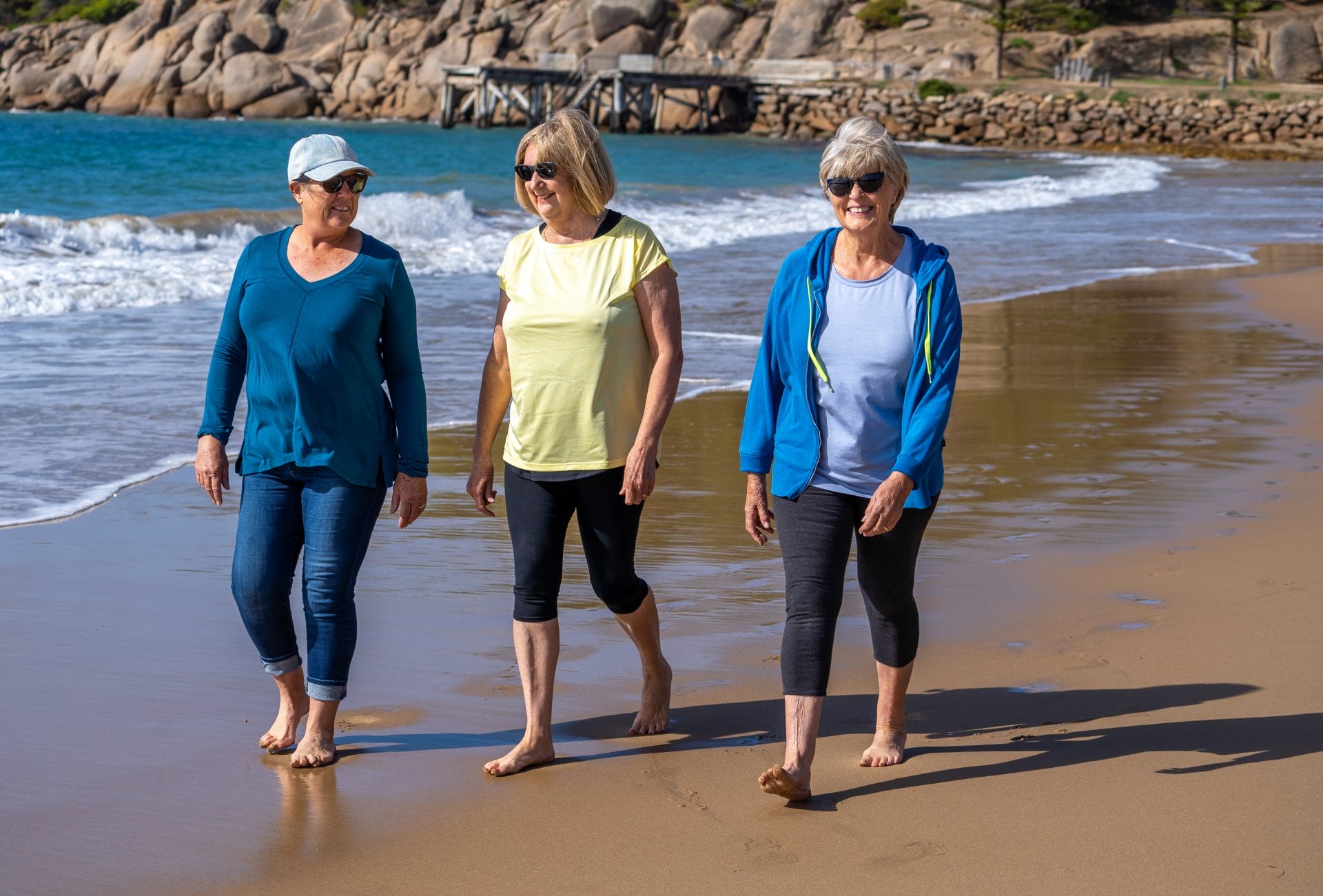
St Agnes’ Care & Lifestyle – Retirement Living
Seniors Exercise
Staying strong, healthy, and active as we age is just as important as when we are young, if not more so. Energy levels and abilities may not be the same, but the benefits of appropriate exercise to suit fitness level and age have a massive impact on well-being and your health.
Here are some types of exercise to consider:
Low-impact Exercise
· Walking
This is one of the simplest forms of exercise you can do, depending on your abilities. It helps improve cardiovascular health without too much strain on joints.
· Swimming
Ideal for those with joint issues and provides a full-body workout.
· Cycling
Either on a stationary bike or a regular bicycle. It’s a low-impact exercise that promotes a healthy heart.
Strength Training
· Weight-bearing exercise
You don’t need to lift heavy weights for this type of workout, but you can still practice strengthening using various techniques including squats, lunges, and push-ups (on the floor or against a wall if better suited). Some of these can be using a chair for balance and careful movements.
· Light resistance training
Use stretch-resistant or pilates bands, light weights, and repetitive movements to improve strength and bone density without risking injury from lifting weights that are too heavy.
Balance and Flexibility
· Clinical pilates
A safe way to improve balance, flexibility, and strength using resistance weights with one-on-one instruction to avoid injury and get maximum benefit.
· Yoga/chair yoga
Stretch and balance with a gentle routine incorporating relaxation and sometimes meditation.
Short-term benefits:
· Better mood: Increase your dopamine levels and decrease stress with regular exercise.
· Improved energy: You’ll find you have so much more energy, both physically and mentally. Exercise provides oxygen to your muscles and brain providing you with an injection of even more energy.
· Improved sleep: If you’re incorporating a regular exercise pattern into your daily routine, you’ll find you sleep better.
Long-term benefits:
· Improved bone density: Our bodies are meant to move and the expression, “use it, or lose it” applies to all your muscles, organs, and bones. Without regular exercise, our bones become frail and more prone to breakages. As we age, it’s even more important to find a good routine.
· Maintained independence: Regular exercise helps seniors to maintain flexibility, strength, and mobility, all important to provide more independence.
· Healthier cardio health: Regular cardio exercises contribute to better circulation and heart health, equating to a lower risk of heart diseases.
Exercises to avoid
Generally avoid high-intensity, high-impact exercise that could put a strain on your body and joints, and increase injury. If you’ve been running all your life or surfing, and still going, keep it up. But if you haven’t done any of these types of exercises since your twenties, don’t start them up now. Listen to your body and start slowly to find your rhythm and what suits you and your body. Always check with your GP or a medical professional before commencing an exercise program.
Staying motivated
First things first. Don’t force yourself to do a form of exercise that you don’t enjoy. Of course, you may not enjoy any exercise if you haven’t had a routine for years, but generally, we know if there’s something we simply don’t like. For example, if you hate the idea of going for a bike ride but enjoy a stroll – go walking and build it up. Start small, even 10 minutes a day to get into some form of routine is worth it and better than doing nothing. Then slowly build it up to where you are comfortable.
1. Set yourself realistic goals.
2. Join a group of like-minded people to exercise with.
3. Be consistent.
4. Listen to your body.
The main thing is to keep moving. Keep it enjoyable and don’t overthink it – just do it! The more you procrastinate, the less likely you’ll get into a routine. If you can encourage a friend to join you, that will keep you motivated and accountable. But commit to yourself that whether or not they join you every time, you’re still doing this. Do it for yourself. For your good health, a happy mindset, and for enjoyment – because even if it feels really hard to start with, you’re likely to relish your time exercising, after you experience the dopamine hits, and social interactions – even if it’s saying hi to people and your good health.
St Agnes’ Retirement Villages
At our villages, we focus on lifestyle, community, and an environment that supports meaningful retirement living. This includes health and wellness activity programs.
We have an exercise group that meets regularly and you’ll be sure to find like-minded people who are active with over 220 residents across our two villages. We have a weekly session of gentle exercise in chairs, at each of our villages. Our residents enjoy their get-togethers to follow instructions with YouTube segments presented by Mike Kutcher Seniors’ Specialist Physiotherapist and Exercise Scientist. The topics include stretching, core balance, dexterity, and the importance of posture. Feedback from our residents is that these exercises help the movement of their hands, feet, and limbs.We’re also about to introduce Chair Yoga and a walking group which came about from resident feedback at our regular consultations.
